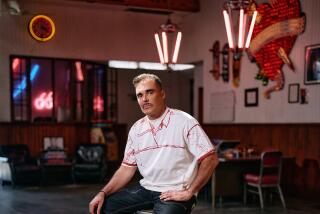30 for Stan Delaplane, a Maker of Memories
- Share via
Stan Delaplane, who died Monday in San Francisco at the age of 80, was a particular breed of newspaperman who won’t pass our way again.
There is little doubt that his era has ended and the loss to us who knew, loved and admired him is like the closing line in a novel that’s difficult to set aside.
We traveled many miles together and he was an uncomplaining companion. I recall how even into his 70s, one night on a long flight to Samoa he gave his bunk to another and slept on the plane floor.
For that was Del, a giving man. We traveled together to Europe and the South Seas and other far corners and I was constantly impressed with how this quiet man with the great wit never, not for a moment, lost his love for newspapering, a love possessed by no other journalist I’d ever known.
Journalist? I’m sure he would be amused by such a pretentious title, for Delaplane never even finished high school. Indeed, he was a graduate of the old-fashioned school of journalism. His newspapering career began one day when he strolled into a Santa Barbara paper and asked for a job.
This was a period that current college- and university-trained reporters possibly wouldn’t understand. If one possessed talent and ambition, formal training wasn’t a prerequisite. Only a love for the game seemed important. No one asked about salaries and benefits and pensions. The pursuit of the story was the prize.
This is how it went with Delaplane. Few readers of the travel pages know that he’d won the Pulitzer Prize as a reporter--long before he was assigned to the travel beat and took up his column in the San Francisco Chronicle.
He won the Pulitzer in 1941 for his series of articles dealing with a California/Oregon faction that threatened to break away and form a 49th state.
One of his two National Headliners awards revolved around an earthy character he dubbed the “Ding Dong Daddy of the D-Car Line,” a former lion trainer, married 18 times, who turned streetcar motorman in the Bay City.
Delaplane was slight, quiet, a private person who valued friends and family. In his travels he particularly enjoyed Ireland and Mexico. His columns were homespun, light, aimed at the ordinary soul who frequently could travel only vicariously.
At home in San Francisco, his headquarters was the Washington Square Bar & Grill where each noon he’d meet with cronies and his four children and sip a martini, a ritual he preserved to the very end. After lunch and a glass of cognac, he’d disappear to his apartment and the typewriter.
Ed Moose, who operates the Washington Square Bar & Grill, is holding a wake for Delaplane on Tuesday. One of those old-fashioned wakes, with pitchers of the Irish coffee that Delaplane is credited with introducing to the United States.
Delaplane’s last column in the San Francisco Chronicle appeared only last Sunday. This week, as a tribute to the memory of a man who entertained millions, Moose ordered that his table remain empty--a single martini placed in front of Delaplane’s plate.
Only the day before he died this gentle man with a penchant for a drink and the typewriter (no word processor for him) hobbled in for the last time.
Moose was concerned. “He was terribly frail, and it was an effort for him just to walk from the taxi to his table. But he had his martini. Then a dessert and his cognac. He was the most gentle, patient man I ever knew. Sometimes he’d sit for a couple of hours waiting for his kids to show up. They never stood him up and although they were late he never scolded them.”
The memories return like scattered autumn leaves. I recall once in Moorea when Delaplane spent an entire day in his over-water bungalow, preparing a week’s worth of columns that a Pan Am pilot had volunteered to deliver to his office in San Francisco the next day. Then just as Delaplane opened the door, a gust of wind swept the columns from his arms.
As they floated to sea a friend dived into the water and Delaplane stood, frantic, shouting from the railing: “Over there, good lord, over there--don’t miss page three!” as the page with the big No. 3 drifted by.
It was a happy ending. All six columns were recovered. As I recall, Delaplane had an extra martini that evening. In fact, several.
“Delaplane was a marvel,” said William German, his newspaper’s executive editor and longtime friend. “He was a reporter who could make even the Pulitzer Prize look easy. He composed essays that were as comfortable as Norman Rockwell paintings. To many of his readers he was simply the best years of our lives.”
More to Read
Sign up for The Wild
We’ll help you find the best places to hike, bike and run, as well as the perfect silent spots for meditation and yoga.
You may occasionally receive promotional content from the Los Angeles Times.






